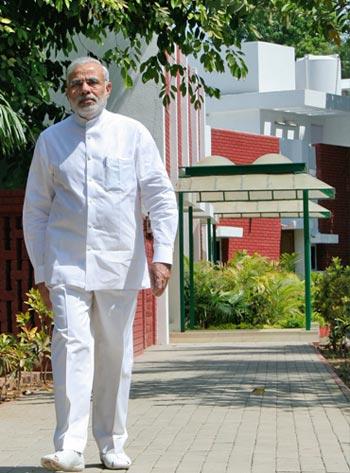 With over 200 convictions by now, including many life sentences, the latest verdict of a Gujarat court in the Naroda Patiya massacre is proof that justice is being delivered in the Gujarat 2002 communal riots.
With over 200 convictions by now, including many life sentences, the latest verdict of a Gujarat court in the Naroda Patiya massacre is proof that justice is being delivered in the Gujarat 2002 communal riots.No communal conflagration anywhere and at any time in India has ever seen so many convictions and decisive verdicts.
But even with mass convictions for mass murder, the only question the media will be asking is: what about HIM?
In media trials outside Gujarat, justice for Gujarat’s victims has come to mean the prosecution of Chief Minister Narendra Modi.
After the Naroda Patiya verdict, and the Supreme Court’s observations yesterday on Modi’s colleague Amit Shah, Modi’s detractors must be smelling blood.
Naroda Patiya saw the largest single case of mass murder – 97 people were killed by Hindu mobs – and the 32 convictions announced today include, for the first time, a former BJP minister and MLA, Maya Kodnani. Modi can’t but be affected by this conviction of a former cabinet colleague.
In Delhi, the Supreme Court observed on Tuesday that it was inclined to transfer the encounter killing case involving Sohrabuddin Sheikh, in which the Central Bureau of Investigation has sought to implicate Amit Shah, out of Gujarat. Shah is out on bail, and the CBI is seeking to cancel it.
A two-judge bench with Justices Aftab Alam and Ranjana Desai made this observation: “So far as the trial is concerned, I have my strong reservations against holding the trial there (in Gujarat). It must go to some other state, like to Bombay in Maharashtra,” The Indian Express quoted Justice Alam as saying. Shah is barred from visiting Gujarat while on bail.
The Kodnani conviction and the possibility of the trial of Shah moving out of Gujarat signal a huge political credibility crisis for Narendra Modi, coming as it does just three months ahead of the state assembly election.
Up ahead is a final decision by an Ahmedabad magistrate’s court that is trying to frame charges in the Gulbarg Society case, where former Congress MP Ehsan Jafri was burnt alive by a mob. Jafri’s widow has accused Modi and several others of complicity in the mob attacks.
A Supreme Court-appointed Special Investigation Team (SIT) said there was no prosecutable evidence against Modi, while an Amicus Curiae report by Raju Ramachandran said Modi could be prosecuted under some provisions of the law.
The key to Modi’s prosecution lies with the testimony of IPS officer Sanjiv Bhatt, who claimed he had attended a meeting on 27 February 2002 where Modi asked the police to let the Hindu mobs vent their anger. While the Amicus Curiae said Bhatt’s testimony – which was not backed by evidence – could not be dismissed outright, the SIT, based on other statements by police officers who were actually present at that 27 February meeting, concluded that Bhatt’s statement could not be taken at face value.
A metropolitan magistrate’s court in Ahmedabad, which is hearing the Gulbarg case, will decide whether to accept the SIT’s closure report on Modi or to include him as an accused in the case.
For Modi, who faces a crucial assembly election this November, it seems all the challenges are coming together.
The first challenge will be the final decision on the SIT report, which could completely mar his fortunes if it goes against him. As an accused, he would have no option but to resign.
The next challenge is the dissidence in his party. In recent months, former Chief Minister Keshubhai Patel has provided a rallying point for rebels by launching his own party. Since Keshubhai could split the Patel vote in the next elections, it would eat into Modi’s vote base. Many Patels, convicted in some of the post-Godhra cases, are also upset over their convictions. Patels stood by Modi the last time despite Keshubhai’s covert dissent. This time the vote could go either way, depending on what Modi does.
The third challenge is, of course, the Congress’ political one. Unlike the last two elections, when the riots themselves became the main points of challenge and thus helped Modi polarise Hindu opinion, this time the Congress is wooing the electorate with promises of freebies – including free land for the poor. By shifting the agenda of this election away from Gujarati asmita (pride) to economic giveaways, the Congress is posing a different challenge this time.
But with several 2002 related cases now bunching up against Modi, the focus could remain on communal issues.
With one minister convicted, another about to go on trial in another state, with his party in silent revolt against him, both at the centre and in the state, and with the Congress in a no-holds-barred drive to oust him, Narendra Modi must be a lonely man today.

Comments